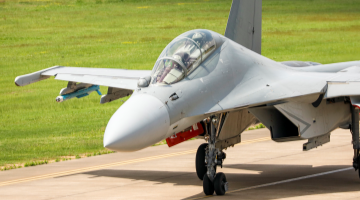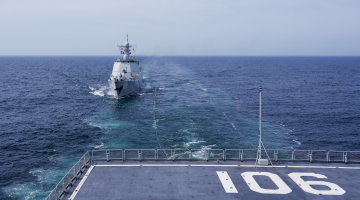By Liu Qingbin
The Cabinet Meeting of the Japanese Government adopted the reciprocal access agreements between Japan and the UK and between Japan and Australia respectively on February 28. The agreement will serve to simplify the entry procedures for military personnel, equipment and ammunition during the Japan-UK joint military exercises and the Japan–Australia joint exercises. The relevant treaties and bills of the agreements will be reviewed by the Diet of Japan.
Just the day before, Japanese Prime Minister Fumio Kishida said at the meeting of the Japanese House of Representatives budget committee that Japan planned to purchase 400 US Tomahawk cruise missiles to be used as equipment to guarantee counterattack capability (the ability to attack enemy bases). This batch of American-made Tomahawk cruise missiles is expected to get commissioned into the Japan Self-Defense Forces (JSDF) in 2026.
Judging from a series of recent actions, Japan has completely abandoned its exclusively defense-oriented strategy and embarked on a road of offense, which is not surprising. Rahm Emanuel, the US ambassador to Japan, who was called the "Supreme Emperor" of Japan by the Nikkan Gendai, told the media recently on the anniversary of his accession that the US-Japan alliance had changed from a "defense-oriented one" to "offensive one". Obviously, the logic is that the US now wants Japan to have offensive military capabilities because to serve its own geostrategic needs, and Japan has made strides towards military "normalization" as permitted.
In fact, the US and Japan have long been brewing the "change". When Emanuel took office as the US ambassador to Japan in 2022, the Russia-Ukraine conflict had not yet broken out. However, he targeted the Japan-Russia peace treaty talks as the "first shot" when taking office, stressing that the sovereignty of the "four northern islands" (the so-called South Kuril Islands by Russia) belongs to Japan, and presenting the US support for Japan to recover all of the four islands, while completely ignoring the peace treaty talks between Japan and Russia so far. Furthermore, his aggressiveness has still been impressive even one year later.
At the end of 2022, the Kishida administration issued three security documents – the National Security Strategy (NSS), National Defense Strategy (NDS) and Defense Buildup Program (DBP), from a "cabinet resolution", instead of being approved by the National Diet. As stated in the three documents, Japan can build “counter attack capability" to launch direct attacks against the missile bases of the enemy, and will significant increase its defense budget and adopt multiple new measures to strengthen its defense capability. In fact, this has marked a fundamental change in Japan's peaceful constitutional principle of "exclusive defense" over the past 70 years after WWII, which has aroused criticism from the Japanese opposition parties and the Japanese people.
Before Japanese Prime Minister Junichiro Koizumi came into power, the mainstream of Japan had been adhering to the Japan-US Security Treaty, because even if the US was attacked, Japan had no obligation or ability to participate in the war, and the Japan-US Security Treaty was in line with the reality. However, under the "neo-liberalism" proposed by Koizumi, Japan has been seeking to improve its international influence and military capability, and the Japan-US Security Treaty gradually turned to be "Japan-US alliance". Today, under the joint promotion of the Liberal Democratic Party (LDP) and the US, the Japan-US alliance has changed from a defense-oriented policy to an offensive one, a fundamental change in nature.
In this process, Japan has used every possible opportunity and excuse to seek the loosening of restrictions, so as to boost its military capability. When attending the hearing of the Japanese House of Representatives budget committee recently, Hiromori Maedomari, a professor at Okinawa International University, warned about the cooperation between the Japanese government and the US in promoting the expansion of the Japanese defense budget. "The first step towards the wartime budgeting system", said the professor
(The author is a visiting professor at Huaqiao University and former professor at Yokohama National University in Japan)
Editor's note: Originally published on opinion.huanqiu.com, this article is translated from Chinese into English and edited by the China Military Online. The information and opinions in this article do not necessarily reflect the views of eng.chinamil.com.cn.









